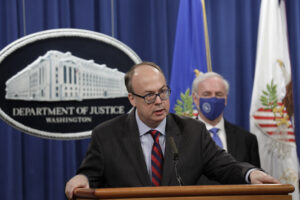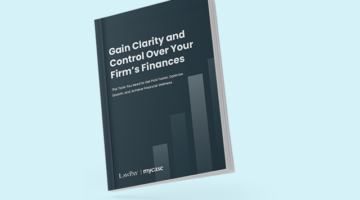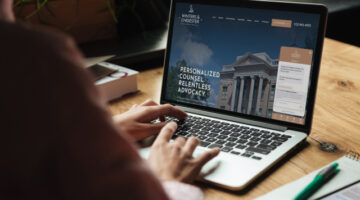
(Photo by Yuri Gripas-Pool/Getty Images)
Last night, the January 6 Select Committee released dozens of witness transcripts from its investigation of the events leading up to the Capitol Riot, among them two interviews with attorney Jeffrey Clark. Clark led a mini-insurrection of his own at the DOJ, where he tried to get himself made acting attorney general so he could announce non-existent investigations of non-existent electoral fraud and empower swing state legislatures to recast electoral votes for Trump.
Clark was a former partner at Kirkland & Ellis who rose to head the Justice Department’s Environmental Division, and yet he spent the waning days of the Trump administration writing emails to his colleagues ranting about 4chan election theories.

Take Control Of Your Firm’s Finances With Tools Built For Success
Position your firm for long-term growth with better financial visibility and control. Learn how to track performance, manage spending, and plan strategically—download the full e-book now.
“If you had not seen it, white hat hackers have evidence, in the public domain, that a Dominion machine accessed the internet through a smart thermostat with a net connection trail leading back to China. ODNI may have additional classified evidence,” he blathered in a December 28, 2021 email demanding a briefing from the Director of National Intelligence.
Small wonder that every lawyer in the upper echelons of the White House and DOJ threatened to resign if this nutbag was put in charge of the Department. But the newly released transcript from the February 5, 2022 interview, as well as the November 5 one which was already on the public record, paint a picture of Clark and his legal team bumbling every aspect of his contact with the Committee.
It started back in October when Clark, having refused to sit for a voluntary interview, received a subpoena for documents and testimony. On November 5, 2021 at 10am, he and his attorney Harry MacDougald showed up with a 14-page letter explaining that Clark would not be testifying that day based on numerous crackpot theories of privilege.
Clark conceded that he’d received no explicit instruction from the former president regarding privilege, but that he considered it to be implicitly invoked by an August 2020 letter from Trump’s lawyer stating that the former president was not invoking privilege as to the Justice Department witnesses already subpoenaed, but promising to go to court and sue to protect “his” rights if the committee issued any more subpoenas. And because the committee continued calling witnesses — presumably after having a hearty belly laugh at the threat — the former president should be deemed to have automatically invoked privilege as to Clark’s testimony.

Your Law Firm’s Website Is Failing You.
Here’s What The Best Ones Are Doing Differently.
Clark and MacDougald showed up intending to drop their letter on the assembled Representatives and immediately flounce out indignantly. And they did flounce, but only after more than an hour of getting hilariously beaten about the head.
Here’s one typical exchange:
Rep. Schiff: I just want to make sure that I have the chronology correct.
The President’s counsel wrote to Mr. Clark saying that they would not seek judicial intervention to prevent his testimony, and they have not done so.
Correct?MacDougald: That is not a fair or accurate summary of the letter.
The letter attaches conditions to that, and those conditions have not been met.Rep. Schiff: Well, if, presumably, Counsel, if the conditions have not been met, President Trump was more than capable of seeking judicial intervention to stop Mr. Clark’s testimony. Correct?
MacDougald: Yes, Congressman Schiff.
Rep. Schiff: And he has not done so. Has he?
MacDougald: Representative, we disagree with that.
MacDougald’s theory was that, because Trump referred to witnesses in a footnote to a brief supporting his motion for preliminary injunction in the case to stop the National Archives from turning his presidential records over to the committee, the executive privilege invocation with respect to Clark was somehow bound up in that case.
“Now, you know, the Trump v. Thompson case will ultimately be decided one way or the other, and then we’ll know where we stand on executive privilege. Both sides will know,” MacDougald said, appearing to guarantee that his client would abide by the court’s determination of the former president’s ability to assert executive privilege in the Archives case.
Spoiler Alert: He would not.
In January, the Supreme Court let stand the rulings of both the trial and appellate courts that Trump could not assert privilege to block the Archives disclosing his documents to the committee. Every single court which addressed the matter, including several of Clark’s Federalist Society brethren, rejected the arguments about the committee lacking a valid legislative purpose or the ability to issue subpoenas due to a “lack of a ranking member.” And not for nothing, but virtually every one of his Justice Department colleagues, as well as several members of the White House Counsel’s office, had already testified about Clark’s shenanigans.
Nevertheless, after an opening statement in which MacDougald accused the committee of leading a “moral panic and a lynch mob” and Clark moaned that his father had been a lifelong Democrat, but would be deeply wounded to see the state of the party today, the witness refused to answer any questions.
“Fifth, and out of an abundance of caution, the law enforcement privilege,” he said over and over again, pausing only occasionally to deliver what he considered to be an edifying lecture on separation of powers, as if executive privilege were his personal sword, rather than a shield for the actual president who explicitly waived it.
In short, they whiffed it. Embarrassingly. And while this is probably low on the list of concerns for a person facing both federal and state investigations, as well as the potential loss of his license to practice law, it’s not a great look.
But don’t worry, Jeff, we’ll call you if there’s an oil spill. Or an arrest warrant.
Liz Dye lives in Baltimore where she writes about law and politics.